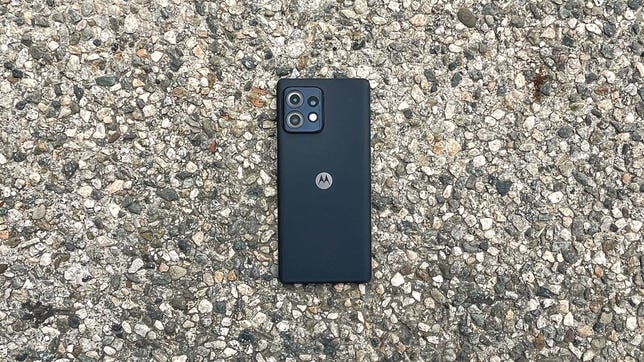Technologies
Motorola Edge Plus Review: Refined Style and Specs, but Still Lost in the Crowd
A premium Android phone with a big battery, snazzy look and competitive price — but not enough to stand out.
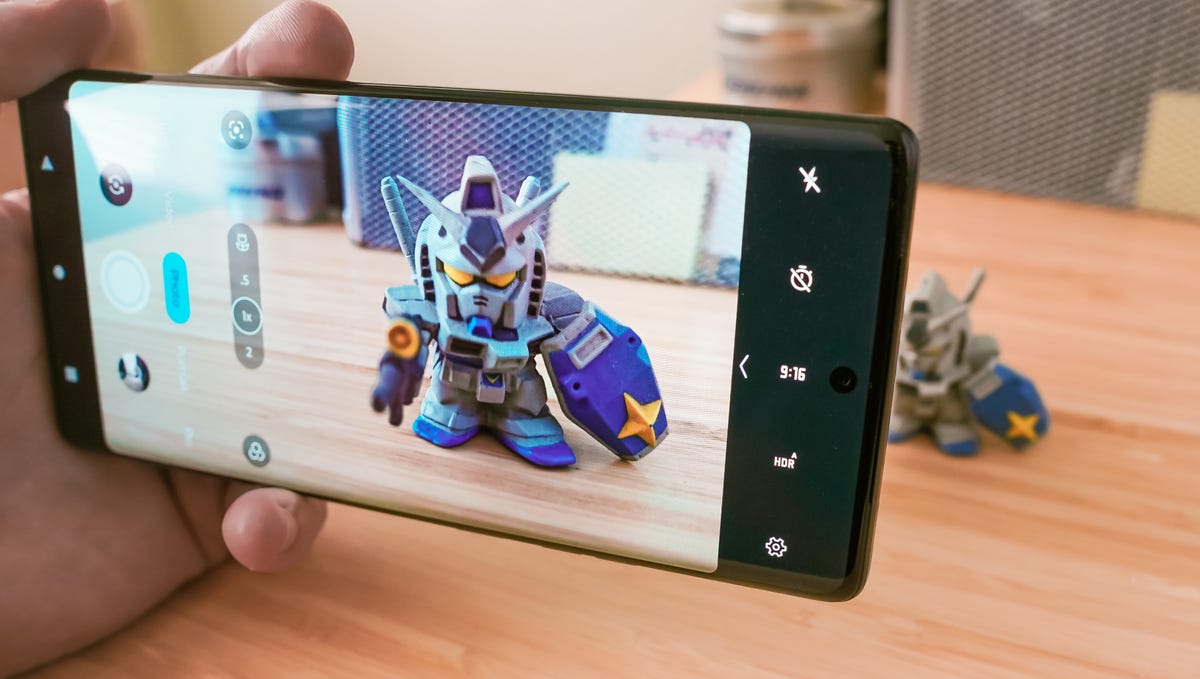
Like
- Refined, premium-looking design
- Big battery and fast charging
- Great curved display and audio
Don’t like
- No expandable storage
- Photos taken are too vibrantly untrue-to-life
- Nothing distinguishes it apart from it competitors
The Motorola Edge Plus is the latest premium smartphone aimed at the US, and an all-around upgrade on last year’s Edge Plus. With its big battery and competitive price, Android fans have another top-tier contender to consider when phone shopping.
Motorola has refined its premium phones over the years, adding some features and taking others away in an effort to find the right combination that will appeal to top-tier phone buyers. The newest Edge Plus is the best combination so far. But it’s also not exactly the same phone sold around the world, since Motorola releases slightly different versions in different regions. For instance, the Edge Plus available in the US is virtually identical to the Edge 40 Pro in Europe and elsewhere, but has a larger battery and more modest recharging speed.
Advertiser Disclosure
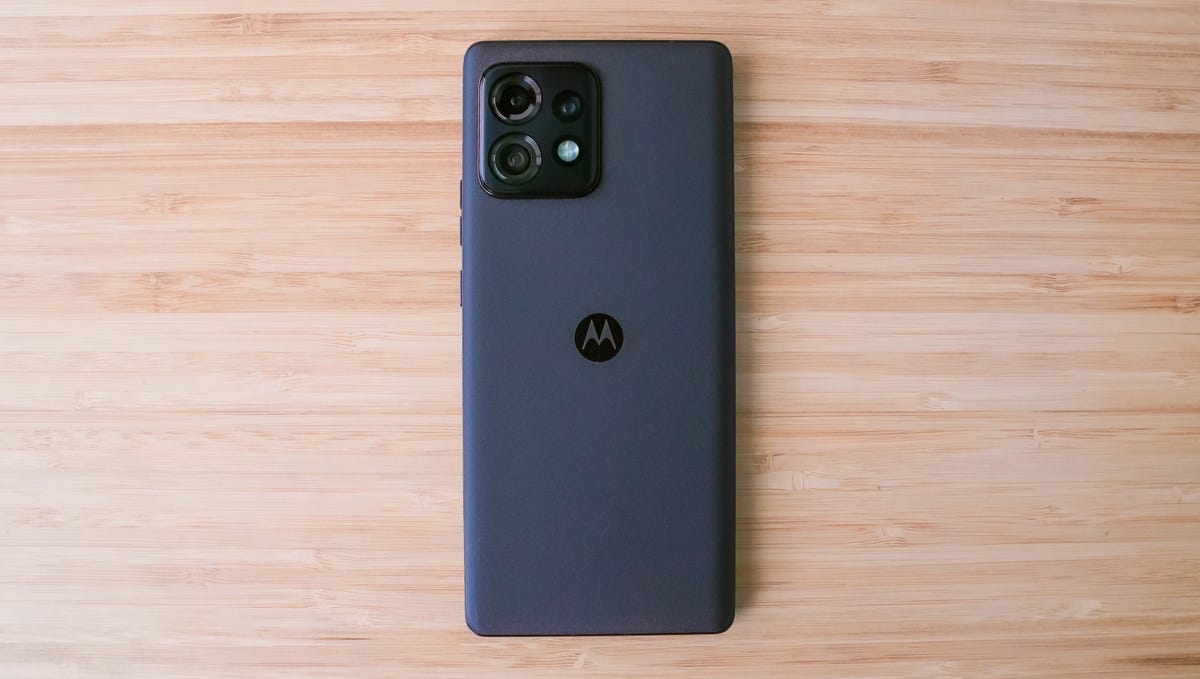
In previous years, it’s been tough to recommend the Edge Plus series over similarly priced (or even cheaper) Samsung rivals. But with its $800 price tag, which is $200 cheaper than its predecessor, the new Edge Plus is a decent alternative to the $800 Samsung Galaxy S23, and lands right in-between the $600 Google Pixel 7 and $900 Pixel 7 Pro.
That doesn’t mean that the Edge Plus is the absolute best value. It’s pricier than the $700 OnePlus 11, though its base model packs more onboard storage. And like other higher-end Android handsets, the Edge Plus faces stiff competition from the $500 Pixel 7A, which has most of its pricier Pixel sibling’s features.
The Motorola Edge Plus looks and feels premium with a sharp display featuring waterfall-style curved edges. That screen along with nearly top-of-the-line specs, like a big battery and truly fast charging speeds, make the Edge Plus a suitable option for anyone who doesn’t need the Galaxy S23’s zoom photo capabilities or the Pixel 7’s AI-powered photo editing. But aside from its tremendous battery life, there isn’t much else that distinguishes the Edge Plus from other premium phones.
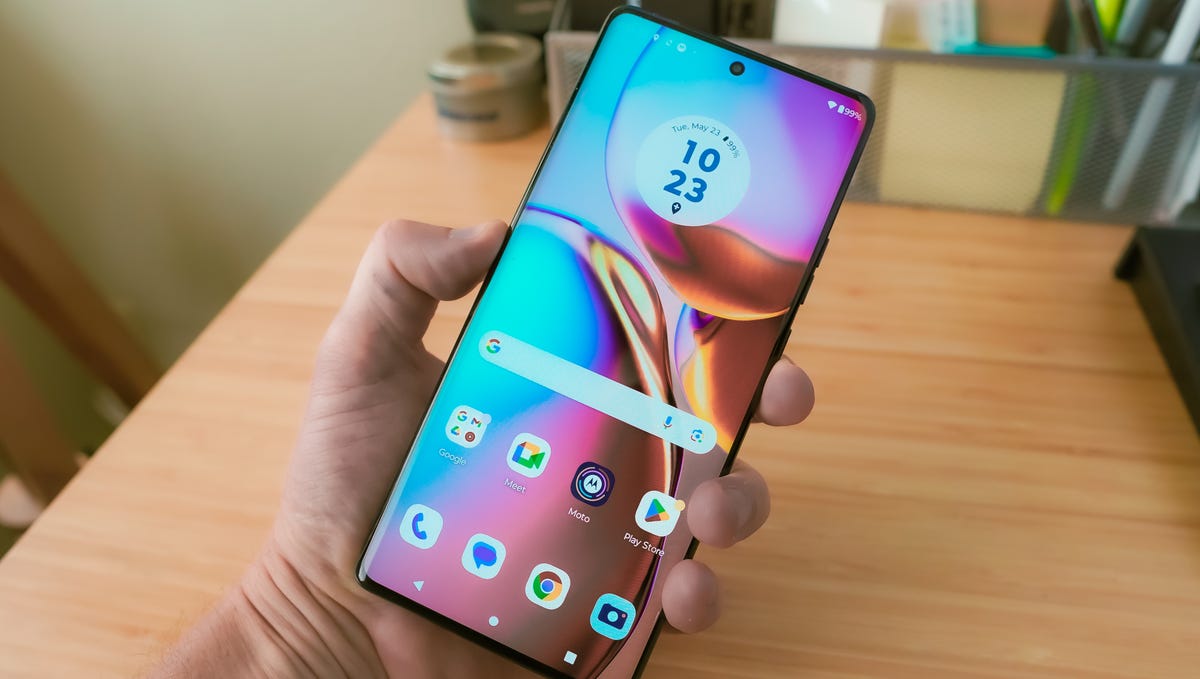
The Edge Plus’ display curves over the side of the phone.
Good battery life, great recharge speeds
The new Motorola Edge Plus has a 5,100-mAh battery, which is 300 mAh more than its predecessor. In practice, the phone easily survived media-heavy everyday activities. When I put the Edge Plus through CNET’s intensive-use media test — which includes streaming movies, playing games, scrolling social media, and joining video calls for a total of 45 minutes — the battery dropped 8%.
That’s comparable to the battery drain on the Galaxy S23 and Pixel 7A in the same test, and a little worse than the Galaxy S23 Plus and Galaxy S23 Ultra. Based on my early testing, the Edge Plus simply lasts longer than many other phones, especially when watching videos and playing games. The battery made it through a full day of use and then some, though it likely won’t be able to last two full days without a recharge.
The Edge Plus’s fast charging outperforms some of its peers. It may not have the ridiculously fast 125-watt charging of the European Edge 40 Pro, but the 68-watt charger included in the box is more than enough. When my test unit was down to 3% battery, a 30-minute recharge juiced it back up to 80%. Compare that to the 25-watt max charging on the standard Galaxy S23 or 45-watt charging on the S23 Plus and Ultra, and the Edge Plus has, well, the edge.
The Edge Plus’ charging doesn’t beat some phones with high-wattage chargers, like the OnePlus 11 with a 100-watt charger that juiced up a phone from zero to fully charged in 26 minutes. In addition to 68-watt wired charging, the Edge Plus has 15-watt wireless charging and can charge other devices at 5 watts.
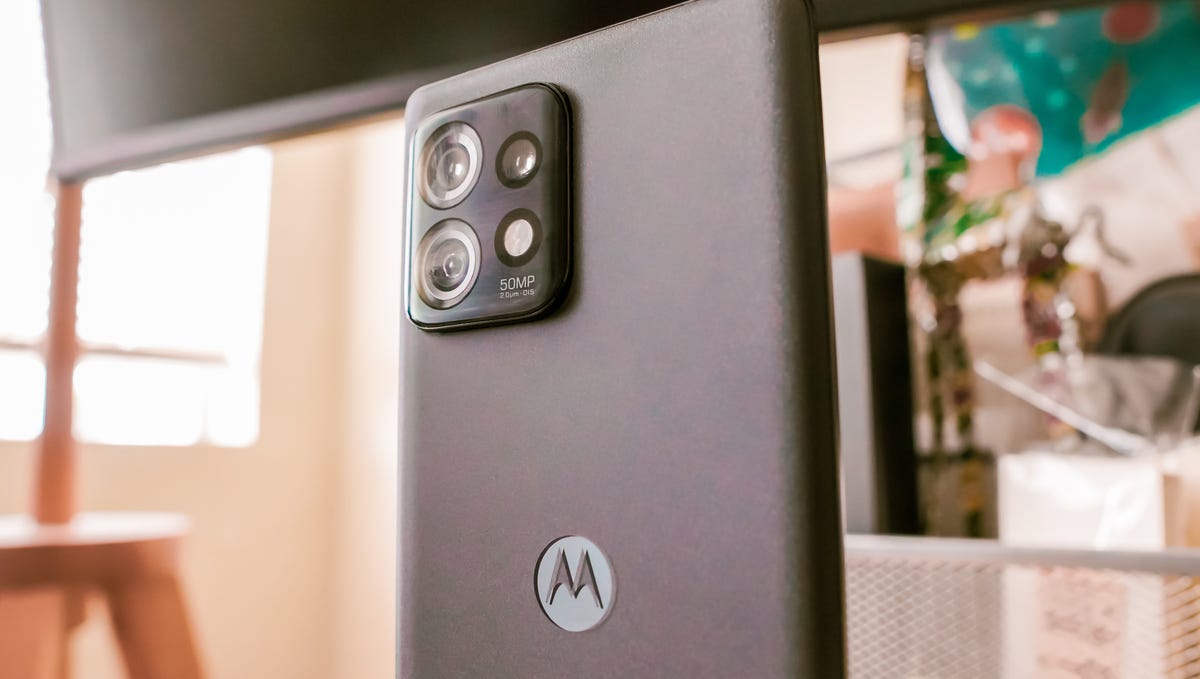
The Edge Plus has a matte-finish metal back.
The best-looking Motorola phone yet (come at me, Razr fans)
Motorola’s premium phones have been on a journey since the brand released the Edge Plus debuted in 2020. The original had an attractive device, and its display edges curved down to abruptly meet the phone’s rear metal plate with such a severe edge that I still remember it biting into my hand as I gripped its sides. The next Edge Plus in 2022 did away with the waterfall-style edges in favor of a standard flat screen, which was less painful but also less stylish.
The latest Edge Plus is a return to form with carefully curved display edges that smoothly meet the polished metal frame. The back is a matte metal with a slight texture, like fine-grain sandpaper, that gives it a refined look and contrasts against the glossy Motorola logo. The smoky glass-covered square camera block is a serious upgrade over the somewhat cheap-looking camera oval on last year’s model. Overall, it’s a phone that would look professional being held up to your ear, if we ever raised our phones like that anymore.
The Edge Plus’s 6.7-inch, 2,400×1,080-pixel OLED display has sharp and clear visuals and supports HDR10 Plus. It has a 165Hz refresh rate, which is technically faster than the last Edge Plus’s 144Hz refresh rate screen. While I could barely tell the difference between the phone’s maximum 165Hz refresh rate and the 120Hz step down setting, the higher refresh rate did look slightly smoother when scrolling through the operating system animations or browsing the web. It also has an under-display fingerprint sensor for security, as well as facial recognition to unlock your phone with your mug.
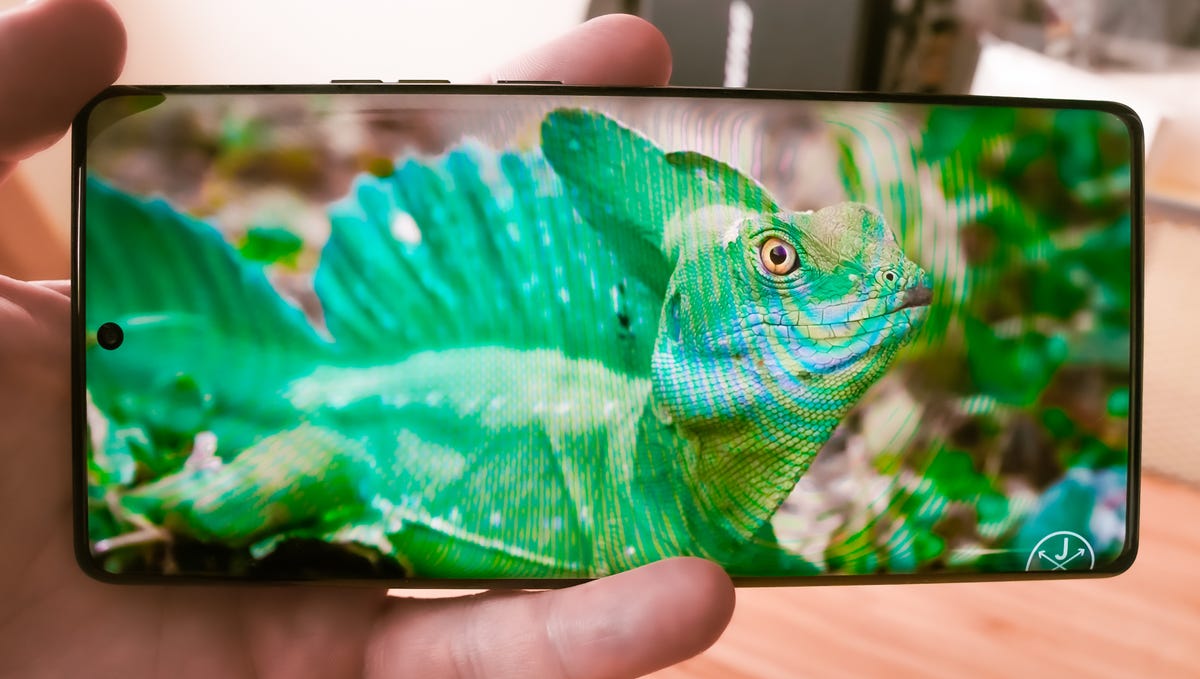
The display has a hole-punch cutout for the selfie camera.
Specs keep up with the competition
The Edge Plus packs a Snapdragon 8 Gen 2 chipset, the top-tier premium silicon from Qualcomm, 8GB of LPDDR5 RAM and either 256GB or 512GB of storage, though it lacks the option for expandable storage via microSD card. This is a bit of a step down from last year’s model, which came in both 8GB and 12GB of RAM configurations, but I didn’t feel the new Edge Plus was let down without the additional memory.
Overall the Edge Plus performs well. I didn’t experience any slowdown or delays transitioning between apps or doing light tasks. The phone kept up with more process-intensive tasks like gaming and fiddling with video, like switching between horizontal and vertical video orientations.
For raw stats, the Edge Plus kept up with its rivals scoring similar benchmark test results to its premium handsets peers. Take a look at Geekbench 5 results below.
Geekbench V.5.0 single-core
Geekbench V.5.0 multicore
The Edge Plus runs Android 13 with a mostly stock version of the operating system and will get three years of Android updates and four years of twice-monthly security updates, which is encouraging for folks who want to keep their phones for longer. Though with Android 14 expected to launch in October, Motorola’s phone won’t be on a par with other leading Android phones for that long. Samsung still leads the pack with a guaranteed five years of major Android updates and security updates.
The Edge Plus also retains Motorola’s small suite of beloved gesture control shortcuts like the chop-chop to turn on the flashlight and the double-twist to open the camera app.
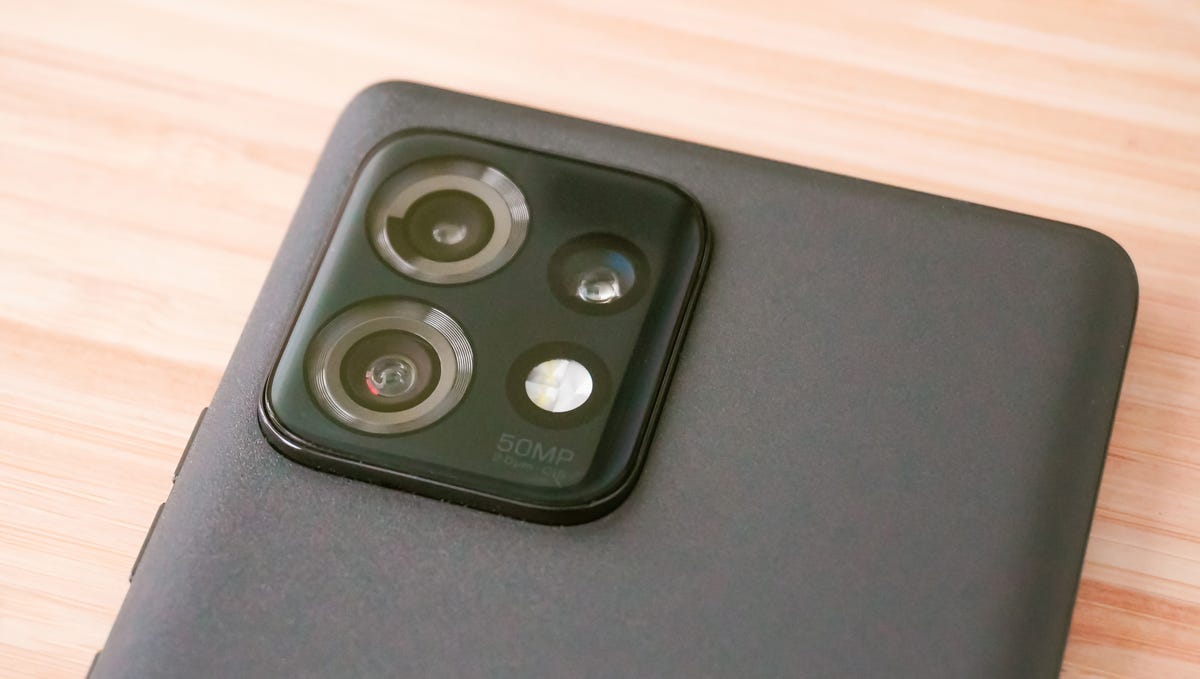
The Edge Plus has triple rear cameras.
Cameras are good, but not the best
The Edge Plus has a triple rear camera consisting of a 50-megapixel, f1.8 main shooter, a 50-megapixel ultrawide and a 12-megapixel, 2x optical zoom camera that extends to 16x digital zoom. Given last year’s Edge Plus lacked a telephoto lens, this alone makes the new model superior to its predecessor.

Edge Plus main camera
Photos taken with Motorola phones have never reached parity with those shot and processed on premium Apple and Samsung phones, and while that’s still the case, Motorola is catching up. In side-by-side comparisons of the same photos taken on an iPhone 12 Pro and Samsung Galaxy S22 Ultra, the Edge Plus’s photos have slightly more saturated colors but lack detail in shadows.

Edge Plus main camera (portrait)
This leads colors to streak into uniform hues rather than dappled with subtle differences from angled light, moisture or some other factor. It’s not too noticeable unless you look closely.
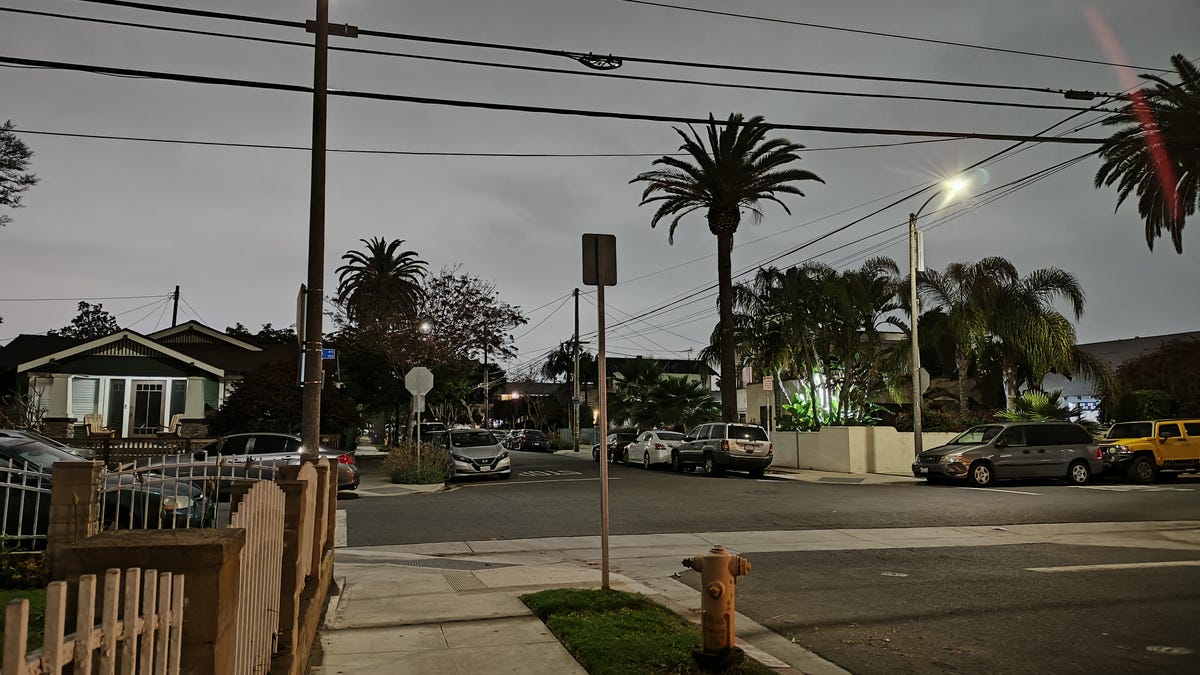
Edge Plus main camera

Edge Plus main camera

Edge Plus telephoto camera (2x zoom)

Edge Plus telephoto camera (16x digital zoom)
The Edge Plus’ 2x telephoto works well and compares favorably with an iPhone, though the premium Galaxy phones still take far clearer photos out to a distance. The ultrawide camera has a narrower field of view, capturing less area than either Galaxy or iPhone.

Edge Plus main camera (portrait)
The Edge Plus’s cameras take capable portrait photos, and while the saturation is a bit much for normal photos, it actually pops nicely against the added depth. At night, photos capture a good amount of light, preserving detail of subjects if losing out on some shadow and texture.
Photos from the 60-megapixel, f/2.2 front-facing shooter have an impressive amount of detail and color, though come out a bit more vibrant than they should. The phone can record 4K video in 60fps with the main and ultrawide cameras.
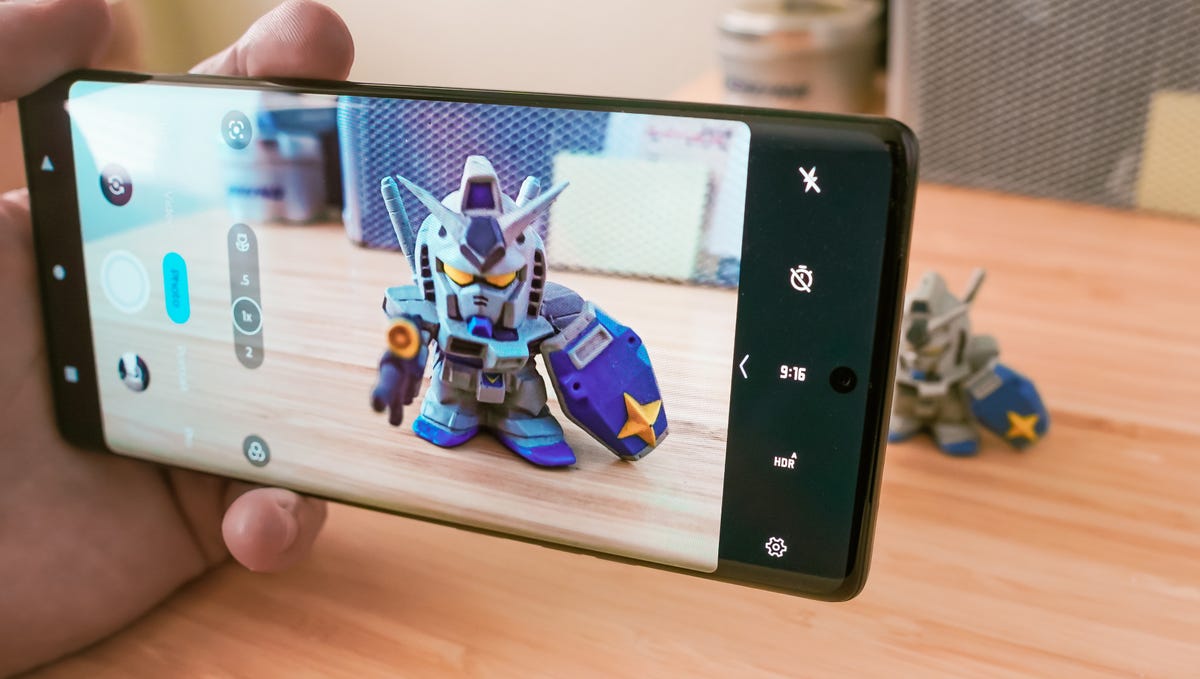
The Edge Plus’ camera app.
Should you buy a Motorola Edge Plus?
Motorola made the right tweaks with the Edge Plus, with a snazzier design and slight upgrades everywhere else to make it better than its predecessor. While its cameras and software still don’t produce photos that truly top those coming out of Samsung or Apple phones, they get close, producing good shots in dark and light settings.
But it’s the Edge Plus’s $800 price that makes it a true competitor to the Galaxy S23 and other premium phones. So long as you don’t need extensive zoom photo capabilities or Google’s line of photo software tricks. The new Edge Plus’s large battery and fast charging should make it a consideration among top-end Android devices.
How we test phones
Every phone tested by CNET’s reviews team was actually used in the real world. We test a phone’s features, play games and take photos. We examine the display to see if it’s bright, sharp and vibrant. We analyze the design and build to see how it is to hold and whether it has an IP-rating for water resistance. We push the processor’s performance to the extremes using both standardized benchmark tools like GeekBench and 3DMark, along with our own anecdotal observations navigating the interface, recording high-resolution videos and playing graphically intense games at high refresh rates.
All the cameras are tested in a variety of conditions from bright sunlight to dark indoor scenes. We try out special features like night mode and portrait mode and compare our findings against similarly priced competing phones. We also check out the battery life by using it daily as well as running a series of battery drain tests.
We take into account additional features like support for 5G, satellite connectivity, fingerprint and face sensors, stylus support, fast charging speeds, foldable displays among others that can be useful. And we balance all of this against the price to give you the verdict on whether that phone, whatever price it is, actually represents good value.
Motorola Edge Plus (2023) specs
| Display size, type, resolution | 6.7-inch, OLED, 2,400×1,080 pixels |
|---|---|
| Pixel density | 394 ppi |
| Dimensions (millimeters) | 161.2 x 74 x 8.59 mm |
| Weight (ounces, grams) | 203 g; 7.2 oz (converted) |
| Mobile software | Android 13 |
| Camera | 50-megapixel main, 50-megapixel ultrawide, 12-megapixel 2x telephoto |
| Front-facing camera | 60-megapixel |
| Video capture | 8K UHD (30fps) |
| Processor | Snapdragon 8 Gen 2 |
| RAM, storage | 8GB RAM; 256 or 512GB storage |
| Expandable storage | None |
| Battery, charger | 5,100 mAh, 68W charging |
| Fingerprint sensor | Yes |
| Connector | USB-C |
| Headphone jack | N/A |
| Special features | 165Hz, 68W charger included in box |
| Price off-contract (USD) | $800 |
| Price (GBP) | Converts to £649 |
| Price (AUD) | Converts to AU$1,225 |
Technologies
A $20K Humanoid Robot to Help Around the House? The Price Isn’t the Only Caveat
The new Neo robot from 1X is designed to do chores. It’ll have to learn a lot from you — and about you.

It stands 5 feet, 6 inches tall, weighs about as much as a golden retriever and costs near the price of a brand-new budget car.
This is Neo, the humanoid robot. It’s billed as a personal assistant you can talk to and eventually rely on to take care of everyday tasks, such as loading the dishwasher and folding laundry.
Neo doesn’t work cheap. It’ll cost you $20,000. And even then, you’ll still have to train this new home bot.
If that sounds enticing, preorders are now open (for a mere $200 down). You’ll be signing up as an early adopter for what Neo’s maker, a California-based company called 1X, is calling a «consumer-ready humanoid.» That’s opposed to other humanoids under development from the likes of Tesla and Figure, which are, for the moment at least, more focused on factory environments.
Neo is a whole order of magnitude different from robot vacuums like those from Roomba, Eufy and Ecovacs, and embodies a long-running sci-fi fantasy of robot maids and butlers doing chores and picking up after us. If this is the future, read on for more of what’s in store.
Don’t miss any of our unbiased tech content and lab-based reviews. Add CNET as a preferred Google source.
What the Neo robot can do around the house
The pitch from 1X is that Neo can do all manner of household chores: fold laundry, run a vacuum, tidy shelves, bring in the groceries. It can open doors, climb stairs and even act as a home entertainment system.
Neo appears to move smoothly, with a soft, almost human-like gait, thanks to 1X’s tendon-driven motor system that gives it gentle motion and impressive strength. The company says it can lift up to 154 pounds and carry 55 pounds, but it is quieter than a refrigerator. It’s covered in soft materials and neutral colors, making it look less intimidating than metallic prototypes from other companies.
The company says Neo has a 4-hour runtime. Its hands are IP68-rated, meaning they’re submersible in water. It can connect via Wi-Fi, Bluetooth and 5G. For conversation, it has a built-in LLM, the same sort of AI technology that powers ChatGPT and Gemini.
The primary way to control the Neo robot will be by speaking to it, just as if it were a person in your home.
Still, Neo’s usefulness today depends heavily on how you define useful. The Wall Street Journal’s Joanna Stern got an up-close look at Neo at 1X’s headquarters and found that, at least for now, it’s largely teleoperated, meaning a human often operates it remotely using a virtual-reality headset and controllers.
«I didn’t see Neo do anything autonomously, although the company did share a video of Neo opening a door on its own,» Stern wrote.
1X CEO Bernt Børnich told her that Neo will do most things autonomously in 2026, though he also acknowledged that the quality «may lag at first.»
What you need to know about Neo and privacy
Part of what early adopters are signing up for is to let Neo learn from their environment so that future versions can operate more independently.
That learning process raises privacy and trust questions. The robot uses a mix of visual, audio and contextual intelligence — meaning it can see, hear and remember interactions with users throughout their homes.
«If you buy this product, it is because you’re OK with that social contract,» Børnich told the Journal. «It’s less about Neo instantly doing your chores and more about you helping Neo learn to do them safely and effectively.»
1X says it’s taking steps to protect your privacy: Neo listens only when it recognizes it’s being addressed, and its cameras will blur out humans. You can restrict Neo from entering or viewing specific areas of your home, and the robot will never be teleoperated without owner approval, the company says.
But inviting an AI-equipped humanoid to observe your home life isn’t a small step.
The first units will ship to customers in the US in 2026. There is a $499 monthly subscription alternative to the $20,000 full-purchase price, though that will be available at an unspecified later date. A broader international rollout is promised for 2027.
Neo’s got a long road ahead of it to live up to the expectations set by Rosie the Robot in The Jetsons way back when. But this is no Hanna-Barbera cartoon. What we’re seeing now is a much more tangible harbinger of change.
Technologies
Today’s NYT Mini Crossword Answers for Saturday, Nov. 1
Here are the answers for The New York Times Mini Crossword for Nov. 1.
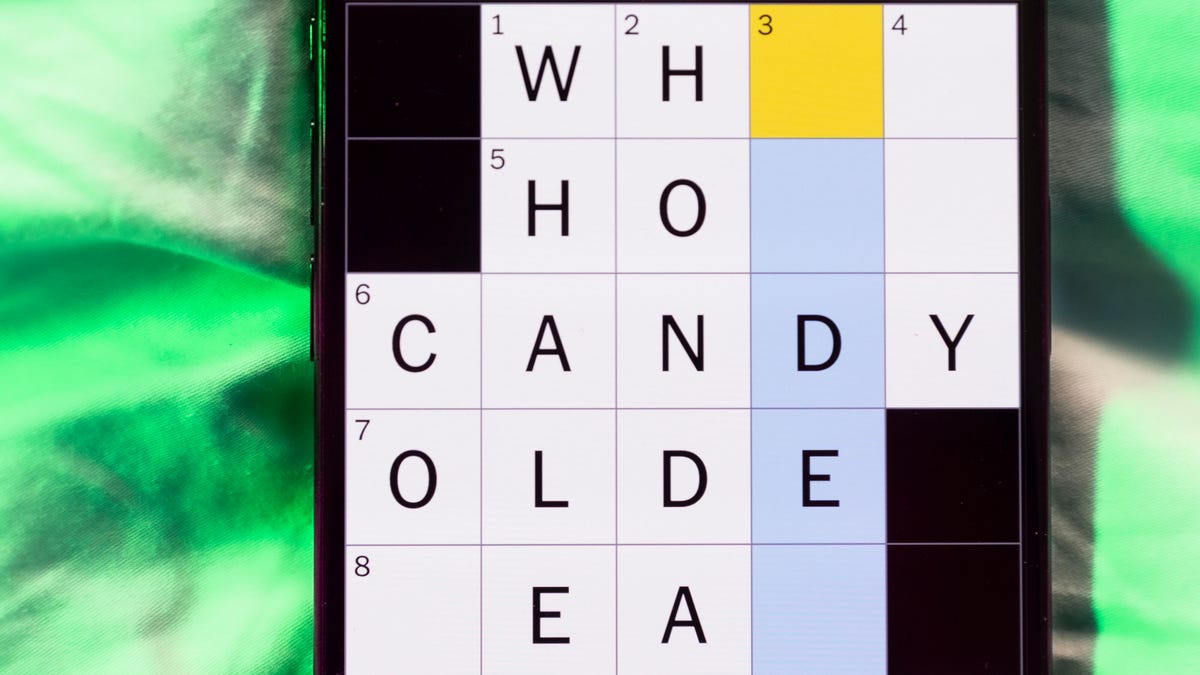
Looking for the most recent Mini Crossword answer? Click here for today’s Mini Crossword hints, as well as our daily answers and hints for The New York Times Wordle, Strands, Connections and Connections: Sports Edition puzzles.
Need some help with today’s Mini Crossword? It’s the big Saturday version, so it could take some time. Read on for the answers. And if you could use some hints and guidance for daily solving, check out our Mini Crossword tips.
If you’re looking for today’s Wordle, Connections, Connections: Sports Edition and Strands answers, you can visit CNET’s NYT puzzle hints page.
Read more: Tips and Tricks for Solving The New York Times Mini Crossword
Let’s get to those Mini Crossword clues and answers.
Mini across clues and answers
1A clue: Ethically sourced, as some egg
Answer: CAGEFREE
9A clue: Residents of Tehran
Answer: IRANIANS
10A clue: Air sign?
Answer: SKYWRITE
11A clue: ___ Faire (medieval-themed festival, informally)
Answer: REN
12A clue: Athlete from Cleveland or the University of Virginia
Answer: CAVALIER
17A clue: Kind of bathing suit
Answer: ONEPIECE
18A clue: Musical whizzes
Answer: MAESTROS
Mini down clues and answers
1D clue: Certain gender identity
Answer: CIS
2D clue: Holy object sought in the first «Indiana Jones» movie
Answer: ARK
3D clue: ___ pride
Answer: GAY
4D clue: Completely surrounds
Answer: ENWRAPS
5D clue: Like a cozy campsite on a cool autumn night, say
Answer: FIRELIT
6D clue: Washington’s Mount ___, the highest peak in the Cascades
Answer: RAINIER
7D clue: Sinus-treating doctor, for short
Answer: ENT
8D clue: Opposite of WNW
Answer: ESE
12D clue: _ _ _mon URL ending
Answer: COM
13D clue: De Armas who starred in 2025’s «Ballerina»
Answer: ANA
14D clue: Shape of flying geese
Answer: VEE
15D clue: Prefix with friendly
Answer: ECO
16D clue: Restaurant booking, informally
Answer: RES
Technologies
Kim Kardashian Denies the Moon Landing and NASA Corrects Her Publicly
It’s one reality TV actor versus another, as Real World alum and acting NASA administrator Sean Duffy tells Kardashian she’s wrong.

NASA says we’ve been to the moon six times. Kim Kardashian says the first time was faked. On a recent episode of The Kardashians, the reality-show star was chatting with actress Sarah Paulson about astronaut Buzz Aldrin, the second man to walk on the moon. That’s when Kardashian revealed she doesn’t believe the 1969 moon landing is real.
Don’t miss any of our unbiased tech content and lab-based reviews. Add CNET as a preferred Google source.
In an interview, Aldrin was asked about the scariest moment of the Apollo 11 mission. Kardashian quotes his reply, «There was no scary moment because it didn’t happen. It could’ve been scary, but it wasn’t because it didn’t happen.»
It’s unclear which interview this was, or what exactly Aldrin was referring to, although it seems like he’s saying a certain frightening moment didn’t come to pass. But Kardashian took the quote to mean the entire moon landing was a hoax that Aldrin chose to reveal via that one quote.
«So I think (the moon landing) didn’t happen,» she said.
NASA acting administrator (and former participant on reality show The Real World) Sean Duffy took exception to the sentiment, replying on X «Yes, Kim Kardashian, we’ve been to the moon before…6 times!»
Yes, @KimKardashian, we’ve been to the Moon before… 6 times!
And even better: @NASAArtemis is going back under the leadership of @POTUS.
We won the last space race and we will win this one too 🇺🇸🚀
🎥: Hulu pic.twitter.com/CkexEEPFSv— NASA Acting Administrator Sean Duffy (@SecDuffyNASA) October 30, 2025
The US did in fact land on the moon on July 20, 1969, with Aldrin and fellow astronaut Neil Armstrong both walking on the lunar surface. Armstrong died in 2012. Aldrin is now 95.
In 2002, Aldrin, then 72, punched a conspiracy theorist who tried to get him to swear the moon landings was faked.
«We won the last space race and we will win this one too!» Duffy told Kardashian on X. He later invited her to an upcoming launch at Kennedy Space Center, though she did not immediately accept.
Kardashian did not respond to a request for comment.
-

 Technologies3 года ago
Technologies3 года agoTech Companies Need to Be Held Accountable for Security, Experts Say
-

 Technologies3 года ago
Technologies3 года agoBest Handheld Game Console in 2023
-

 Technologies3 года ago
Technologies3 года agoTighten Up Your VR Game With the Best Head Straps for Quest 2
-

 Technologies4 года ago
Technologies4 года agoVerum, Wickr and Threema: next generation secured messengers
-

 Technologies4 года ago
Technologies4 года agoBlack Friday 2021: The best deals on TVs, headphones, kitchenware, and more
-

 Technologies4 года ago
Technologies4 года agoGoogle to require vaccinations as Silicon Valley rethinks return-to-office policies
-

 Technologies4 года ago
Technologies4 года agoOlivia Harlan Dekker for Verum Messenger
-

 Technologies4 года ago
Technologies4 года agoiPhone 13 event: How to watch Apple’s big announcement tomorrow

